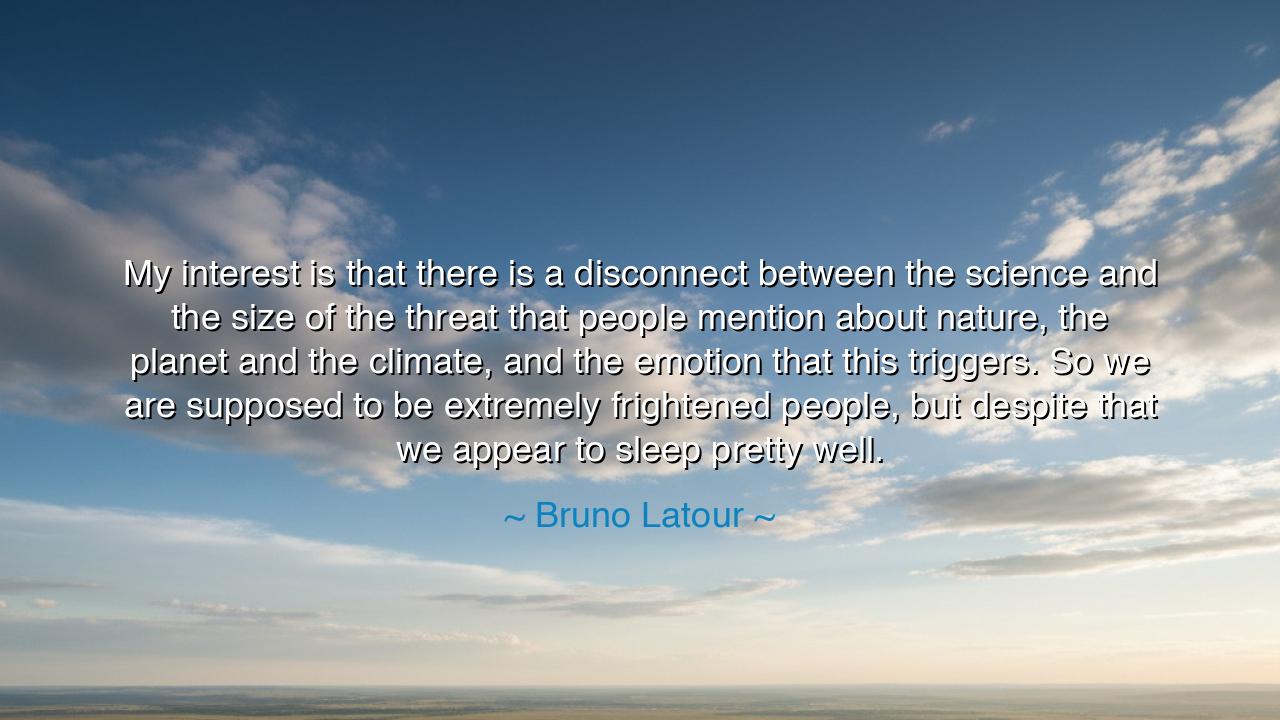
My interest is that there is a disconnect between the science and
My interest is that there is a disconnect between the science and the size of the threat that people mention about nature, the planet and the climate, and the emotion that this triggers. So we are supposed to be extremely frightened people, but despite that we appear to sleep pretty well.






"My interest is that there is a disconnect between the science and the size of the threat that people mention about nature, the planet and the climate, and the emotion that this triggers. So we are supposed to be extremely frightened people, but despite that we appear to sleep pretty well." These words, spoken by the astute philosopher and sociologist Bruno Latour, pierce through the veil of modern apathy and highlight a profound dissonance in our relationship with the natural world. There, in the heart of his reflection, lies an uncomfortable truth: science has revealed the immense threats that face our planet, yet our emotions and actions remain strangely detached. Despite the warnings of impending disaster—of a climate in peril, of ecosystems unraveling before our very eyes—we continue to sleep, untouched by the urgency that should consume us.
This disconnect, as Latour points out, is not a mere oversight; it is a reflection of the tension between the rational mind and the visceral heart. We know, in the cold, precise language of science, that our planet teeters on the edge of catastrophe. The evidence is irrefutable—the ice caps are melting, the forests are burning, and the air itself is poisoned with the remnants of our industrial ambitions. And yet, the emotion that should arise from this knowledge—the fear, the urgency, the call to action—seems to be muted. We are told to fear, to act, but in our hearts, we remain strangely unmoved. Why is it, then, that while the threat grows ever larger, our response seems ever smaller?
Consider the ancient stories of civilizations on the brink of destruction—Pompeii, for example, a city whose very foundations were built upon the slumbering fury of Mount Vesuvius. The people of that city, in their complacency and blindness to the natural world around them, continued their daily lives as if the mountain would never awaken. Despite the signs, despite the warnings of the earthquake that had shaken their lands, they slept. And then, one day, the mountain erupted, and the city was buried beneath a torrent of fire and ash. In that moment, the disconnect was shattered, but it was too late. Pompeii serves as a stark reminder that when we fail to heed the signs of nature, when we are lulled into a false sense of security, disaster is often but a step away.
This same disconnect that Latour describes is at the heart of our modern dilemma. We are faced with climate change, a force so powerful and pervasive that it threatens to reshape the very fabric of life on Earth. And yet, despite the overwhelming evidence, the emotion that should drive us to action seems to be missing. Why do we continue to live as if there is no storm on the horizon? Why do we sleep so soundly, lulled by the comforts of our modern lives, as the world burns around us? Is it that we have become so disconnected from the rhythms of nature, so separated from the land that sustains us, that we can no longer feel the pulse of the earth beneath our feet?
Latour’s words challenge us to confront this paradox head-on. He calls us to awaken from our slumber, to bridge the gap between what we know and how we feel. Knowledge alone is not enough. It is action that is required—urgent and bold action. The time for mere contemplation has passed. We must allow the knowledge that science has provided to stir something deep within us, to awaken a primal emotion that drives us to protect the planet that has given us life. This is not merely an intellectual exercise; it is a call to arms—a call to safeguard what is ours, to defend the future of our children and the world they will inherit.
So, what is the lesson here? It is this: we must not allow the science of climate change to remain an intellectual abstraction, something we understand but do not truly feel. We must let it ignite our hearts, fuel our actions, and reshape the way we live. We must act, not out of fear, but out of a deep sense of responsibility to the world around us. We are the stewards of this Earth, and if we are to protect it, we must feel the weight of that responsibility deeply. The time to awaken is now.
In our own lives, let us ask ourselves: How can we bridge the gap between the knowledge we have and the actions we take? How can we transform our understanding into meaningful change? Whether it is reducing our carbon footprint, advocating for policy changes, or simply living in closer harmony with the natural world, we must take action now. For we are all part of this great web of life, and if we continue to sleep through the storms of climate crisis, we too may one day awaken to find that the Earth we knew is no more. The time to act is upon us, and the call to do so comes not just from science, but from the very soul of the Earth itself.






AAdministratorAdministrator
Welcome, honored guests. Please leave a comment, we will respond soon